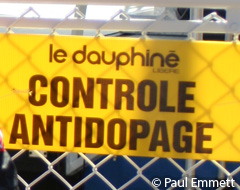 Peter Janssen, former team doctor with the Vacansoleil squad, has published a book that is certain to provoke argument. His newly released work ‘Blood Form’ not only argues that the banned blood-booster is harmless, but also states that he could see reasons to dope riders in order to safeguard their wellbeing.
Peter Janssen, former team doctor with the Vacansoleil squad, has published a book that is certain to provoke argument. His newly released work ‘Blood Form’ not only argues that the banned blood-booster is harmless, but also states that he could see reasons to dope riders in order to safeguard their wellbeing.
“If my son was a professional cyclist and had to ride a Grand Tour like the Giro d’Italia right now, I would accompany him on the trip and make sure that he sometimes got a little EPO,” he said in an interview with Sportwereld. “Not to increase his chance of winning, but simply to maintain his health.
“But I would discourage him, for his reputation and that of the beautiful sport of cycling.”
EPO earned the reputation as a dangerous drug when large numbers of Dutch riders died in their sleep prior to the UCI’s introduction of a 50% hematocrit limit at the end of 1996. Prior to that there existed many tales of riders sleeping with heart-rate monitors on, using alarms to wake them if the pulse dropped below a certain number of beats per minute. They would then exercise to raise the heart-rate before returning to sleep.
There are anecdotal reports of riders being seen doing chin-ups and riding exercise bikes in hotels in the middle of the night, presumably for this reason.
It has long been accepted that a thickened blood carries increased risks of thrombosis, stroke and heart attacks, but Janssen controversially denies this.
“The best evidence is that Italy was the first country where plenty was used and they have no cardiac deaths,” he said, rubbishing the linking of those Dutch deaths to EPO. “The names of deceased riders were given who had nothing to do with the product. There was a list of alleged doping deaths given to medical conferences without any medical grounds.”
However he doesn’t address the fact that several Italian professionals have died from heart failure, contradicting his assertion that none have passed away.
Italians were ‘trendsetters’:
Cycling coaches Francesco Conconi and Michele Ferrari have long been labelled doping doctors, but have denied they played this role in the sport. Janssen contradicts this, saying that they played a large role in the use of the product.
“For years, Italian doctors and scientists such as Conconi and Ferrari in Italy contributed to the spread of EPO amongst their athletes, mostly cyclists,” he said. “Italian teams were trendsetters.”
He points to the under 23 world road race championship in 1996, where Italians took the first four places with Giulano Figueras, Roberto Sgambelluri, Luca Sironi and Paolo Bettini. “That was the EPO world championship,” he claims.
These and other assertions made by Janssen will not be welcomed by his former team Vacansoleil, who will fear being labelled by guilt through association. Sportwereld doesn’t appear to have asked him if he facilitated any riders on the team to dope, but it is nevertheless damaging for any doctor to appear to advocate the use of banned substances.
His statements are likely to lead to a lot of headlines in the Netherlands, particularly as it is hosting the start of the Giro d’Italia. Yet, given that he’s a book to sell, that’s probably exactly what he is aiming to do.